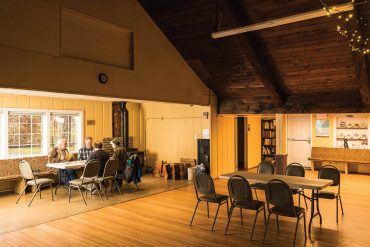written by Bronte Dod | photo courtesy of Multnomah Education Service District
For Randy Schild, superintendent of the Tillamook School District, the importance of Outdoor School was solidified a decade ago when the school took its second graders to the coast for the day. When they got back to school, they learned that, for ten of those students, that had been their first trip to the ocean, even though they lived within minutes of it.
After that, Schild made outdoor education a priority. “We made the commitment at that point that our education will also educate the students about where we live and how we live,” Schild said. But it did come with a constant financial struggle.
Outdoor School and other outdoor education programs began in Oregon in the late 1950s, but finding the money to support them has been a grassroots effort. Funding has come from a variety of sources, including grants, the state government, fundraisers and parent contribution.
The result was that not all districts could afford the programs. In some cases, not every student could attend with their class, which created a problem of equity. “It was not an efficient, effective or sustainable way to fund an educational program,” Schild said.
Outdoor School for All,a political action committee, of which Schild is member, is creating legislation to change how Outdoor School works in Oregon. Its goal is to make Outdoor School a reality for every Oregon sixth grader by ensuring state funding into the future.
Rex Burkholder, the chair of Outdoor School for All, is spearheading the politics of the effort. “The unique thing about Oregon’s Outdoor School is that it was almost universal at one time,which is our goal,” Burkholder said.
Burkholder has been an advocate for the program since his son was in school and witnessed the program’s struggle to find funding. “I know we get hung up on test scores, but the reality is that there’s so much more for kids to learn,” Burkholder said.
This past spring, Oregon senators passed Senate Bill 439, which provides a statewide system of organizing Outdoor School programs through Oregon State University. The legislation also standardized the programs across the state, making sure that the programs meet Common Core and Next Generation standards.
The funding for the program will be created by Initiative 67, which Outdoor School for All is trying to get on the November ballot. The Initiative would create a permanent funding solution through the Oregon State Lottery fund.
Schild, who grew up in Oregon and was able to attend Outdoor School as a sixth grader, believes that Outdoor School—similar to Oregon’s public beaches and the beverage container deposit system—is integral to the Oregonian identity. “It’s a shared experience that can unite us,” Schild said.










I had outdoor school when I was in sixth grade in 1979 when I attended Binnsmead Middle School. To this day I still talk about my experiences and wish that ALL students across the nation took outdoor school. I am forever thankful for the learning experience that will last a lifetime and was able to passed them on to my son.
As a Naturalist, I feel this Initiative is vital. I’m an Oregon citizen, how do we help make sure it gets on the ballot in November?
I have been an Instructor for the Taft Outdoor School program for several years. You would think that kids from these coastal communities, with their strong ties to forest and ocean, would not need this experience. You would be wrong.
These kids are at the age where intelligence starts to bloom, and this experience is critical to awaking their sense of connection to land, water, air, and resources. it is important that they learn that there are things not contained in their electronic devices.
My parents gave me these experiences. That apparently doesn’t happen much anymore. So it falls to the schools to do it.